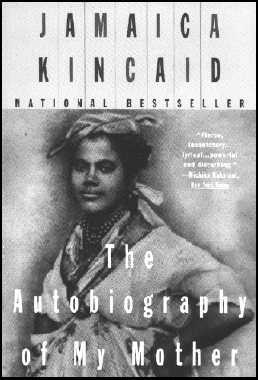|
The Autobiography of My Mother |
 |
|
by Elizabeth Hayes
"Know thy self" as a strategy to relate more effectively to others is turned on its head in Jamaica Kincaid's novel The Autobiography of My Mother. Xuela Claudette
Lack of love shapes the narrator's life. Her steely father is a government official by virtue of mixed Carib and Scottish heritage. Xuela's mother is of African descent, and these racial distinctions challenge all of the relationships on this "outpost of despair." Xuela's gray-eyed father sends her into various unsatisfactory living conditions. First with his laundress, then as a de facto courtesan to one of his colleges. Although he ensures that she gets an education, she is left on her own to navigate the inevitable trials of coming of age as a woman of color on a colonized island offering few choices. Autobiography taken to an extreme is her escape. Obsession with the minutia of human function allows her to live in the sensations of her skin and not to ask for anything intangible such as love. Xuela decides she will "not allow the full weight of her desire to make a pawn of [her]. She becomes intimate with the sensations and odors of her body and exerts control by gruesomely terminating all of her pregnancies for she knows that she has no love to give. These strategies make a believable albeit unlikeable heroine. Autobiography, regardless of what it reveals, becomes a source of renewal. "The perfume of your own name and your own deeds is intoxicating." Whether it is becoming or not, Xuela decides to be fully who she is given the perimeters of her existence.
"Overtaken by officialdom," Xuela's father, a jailer, uses an opposite strategy by choosing not to reveal to himself or anyone, but "to live forever locked up in an iron cage made of [his] own silence." There are many references to the mask he creates in order to conjure his outward appearance-his disguise. He is cruel and takes advantage of his posistion to become a well-off man who wears "a smile on his lips at all times when he is in public, but is directed inward, not outward."
Kincaid wants us to know that these characters are the vestiges of British colonial rule and this is clear throughout the novel. Unfortunately, Kincaid indulges in a lecture towards the end of the book that weakens the effect of the characterizations. Dense with allusions and repetition, the prose becomes trying at times in its attempt to be poetic. Kincaid struggles for a rhythm but never falls into a satisfying cadence. Although she hits some very good notes, she needs to stay with her characters and write a song.
|
||
top | this issue | ADA home |
||
 Richardson's mother dies at the moment of her birth and this "autobiography" is an account of the strategies this isolated woman employs to survive without love. It is, in Xuela's words, "an account of the person I didn't allow myself to become." Instead of seeking connection, Xuela's self-exploration isolates her. She becomes self-contained, like the Carribean island of Dominica that is the setting of this grim story of human relations and "voluptuous blackness."
Richardson's mother dies at the moment of her birth and this "autobiography" is an account of the strategies this isolated woman employs to survive without love. It is, in Xuela's words, "an account of the person I didn't allow myself to become." Instead of seeking connection, Xuela's self-exploration isolates her. She becomes self-contained, like the Carribean island of Dominica that is the setting of this grim story of human relations and "voluptuous blackness."